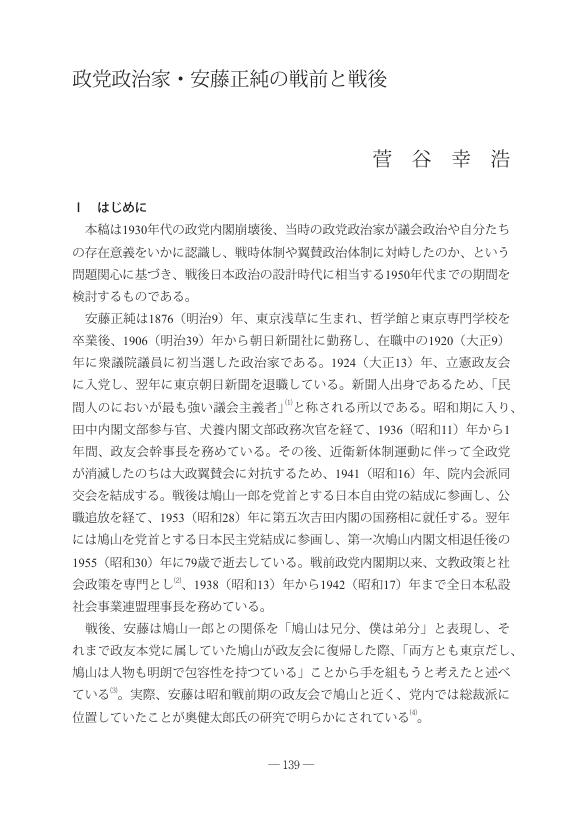20 0 0 0 OA 青嵐会における自主憲法制定構想の展開と挫折
- 著者
- 菅谷 幸浩
- 出版者
- 憲法学会
- 雑誌
- 憲法研究 (ISSN:03891089)
- 巻号頁・発行日
- vol.53, pp.97, 2021 (Released:2021-10-05)
4 0 0 0 OA 清水澄の憲法学と昭和戦前期の宮中
- 著者
- 菅谷 幸浩
- 出版者
- JAPANESE POLITICAL SCIENCE ASSOCIATION
- 雑誌
- 年報政治学 (ISSN:05494192)
- 巻号頁・発行日
- vol.60, no.1, pp.1_162-1_182, 2009 (Released:2013-02-07)
Toru Shimizu was a scholar of constitutional and administrative laws in Modern Japan. He lectured the Taisho Emperor as an employee of the Imperial Household Ministry, and young Showa Emperor as an employee at the educational section of the prince's palace. The objective of this study is to elucidate the political processes in the pre-war Showa Era, in which the Meiji constitutional system unsettled and collapsed, by reviewing the doctrine of Shimizu and its political position. In this study, the doctrine of Shimizu is compared with the constitutional theory of Tatsukichi Minobe from the viewpoint of constitutionalism and liberalism. In detail, the author discussed the commonalities and differences regarding the Emperor's political power, the state minister's consulting responsibility, the Imperial Diet's position and roles, party cabinet system theory, and electoral system theory, etc. In addition, the author attempts to conduct a comprehensive analysis, discussing how the doctrine of Shimizu was evaluated by the emperor's entourages including Nobuaki Makino and Kouichi Kido, middle-class army personnel, and right-wing constitutional scholars, and to position his presence in the Japanese political history in the 1930s.
3 0 0 0 OA 政党政治家・安藤正純の戦前と戦後
- 著者
- 菅谷 幸浩
- 出版者
- 日本法政学会
- 雑誌
- 法政論叢 (ISSN:03865266)
- 巻号頁・発行日
- vol.54, no.2, pp.139, 2018 (Released:2018-09-27)
1 0 0 0 政党政治家・安藤正純の戦前と戦後
- 著者
- 菅谷 幸浩
- 出版者
- 日本法政学会
- 雑誌
- 法政論叢 (ISSN:03865266)
- 巻号頁・発行日
- vol.54, no.2, 2018
1 0 0 0 OA 広田内閣と宇垣一成 : 朝鮮総督辞任問題をめぐる考察
- 著者
- 菅谷 幸浩
- 雑誌
- 学習院大学大学院政治学研究科政治学論集
- 巻号頁・発行日
- vol.27, pp.1-32, 2014-03-01

